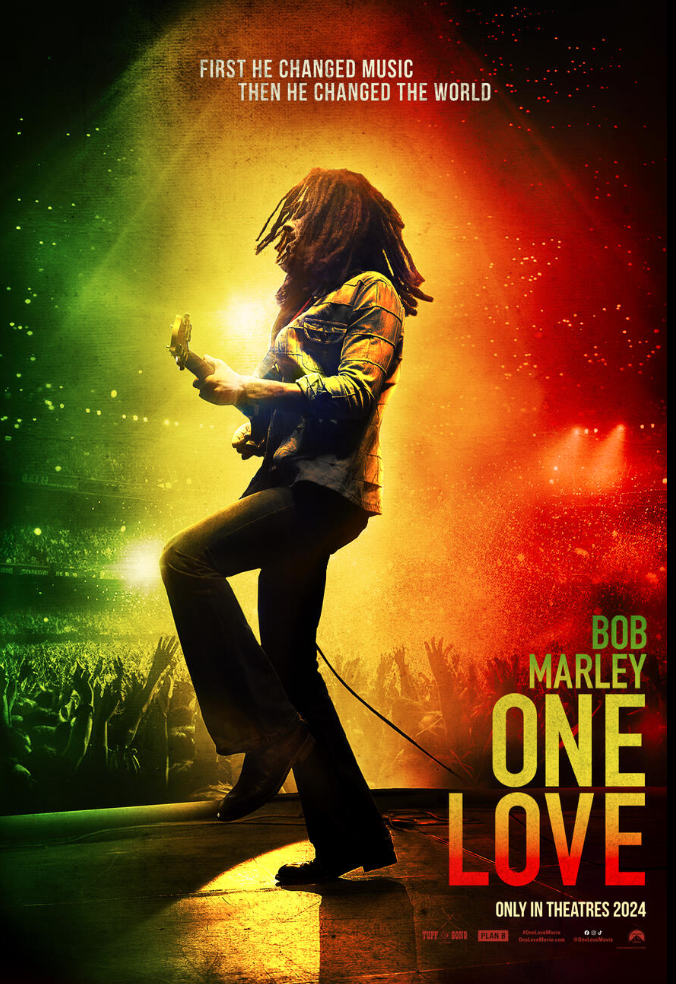Bob Marley’s biopic “Bob Marley: One Love” was released on the day of love, Wednesday, Feb. 14 and left me jaw dropped.
If you don’t know who Bob Marley is, you’ve been living under a rock. Marley was an international legend through his powerful reggae music which united Jamaica during a time known as the Rastafari movement, a new emerging religion during a political and violent period in Jamaica. This movement was a reaction to the then dominant rule of British colonial culture all of which was illustrated in the movie. Marley was the unofficial face of peace for all Jamaicans and a sign of hope.
The movie stars Kingsley Ben-Adir as Bob Marley and Lashana Lynch as his wife Rita. Ben-Adir is most notably known for his past roles in which he played Barack Obama and Malcolm X meaning he’s had quite a lot of experience in channeling public figures and illustrating their lives on screen. While many people had an issue with Ben-Adir’s ethnic background not being Jamaican or his lack of shared physical features with Marley, I think internally Ben-Adir channeled Marley beautifully.
The film focuses on a snippet of Marley’s life from his attempted assassination to his move to London, up until his iconic peace concert. The opening scene begins with this assassination attempt. From there, we’re swept to his life in London and are shown the process of him writing most of his album “Exodus.” Music, of course, is a recurring motif throughout the movie, specifically his song “Redemption Songs” which was played beautifully and intimately in front of his family in one of the last scenes.
The cinematography was beautifully done, encompassing the large crowds and emphasizing emotions when needed. There is one scene in particular that stood out to me. It kept appearing as a flashback which was a symbolic scene of his father on a horse and a field which then was engulfed in flames. The wide shot of the burning field and lighting made the scene mysterious yet mesmerizing.
Occasionally we’re shown flashbacks of a young Marley. They showed his introduction and soon conversion to Rastafarism along with the origins of his relationship with his later wife, Rita. They also entailed scenes with Marley’s father walking out of him and how that affected him.
While I think altogether this film was a 10/10, some argue that this was too basic and not made for “true” fans. Jack Hamilton from Slate described Marley’s legacy has been dissolved down to holding the highest of status in dorm rooms such as posters.
“In the United States, Marley has been a staple of dorm-room walls for generations,” Hamilton stated in his article on the movie. “Marley has become the embodiment of a musician whom people own posters and T-shirts of but don’t actually listen to, which isn’t totally fair to most of the owners of those posters and T-shirts.”
While I agree that there are many people out there who have posters and shirts of him solely for the aesthetic or look, that applies to every famous person/band. The same thing happens with Pink Floyd for example. I think this film is a perfect introduction to Marley and his music for people who may not know much about him or his short-lived life. The impact of his music was illustrated as well as his internal conflict. This film humanized him 10 times, showing more of his struggles.
Sadly, the movie ended with Marley’s diagnosis of his cancer, a rare melanoma. His impactful peace concert was performed by Ben-Adir in the film who radiated everything Marley down to the dancing and voice.
This film made my appreciation of music and the impact that it could have skyrocketed. While I knew his impact was large on not just Jamaica, but the world, it never fully processed in my head. This film executed the hardships and risks that were taken by Marley. His music has forever and will forever leave an undeniable mark on the world and this movie is proof.


